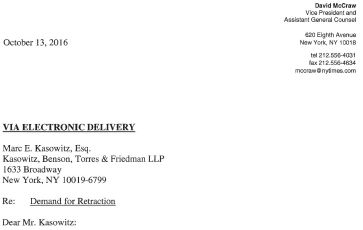It's not often that our little blog intersects with such titanic struggles as the U.S. presidential race – and by using the term "titanic" I certainly don't mean to suggest that anything disastrous is in the future.
After the New York Times published personal allegations of sexual assault against presidential candidate Donald Trump, the candidate's lawyers promptly fired a shot across the bow, threatening legal action for libel and demanding that the article be removed from the Times's website. Last week, the lawyer for the New York Times responded to lawyers for Mr. Trump with a succinct defense of their publication of the article, arguing "We did what the law allows: We published newsworthy information about a subject of deep public concern."
If this had happened in Canada, the law would almost certainly favour the position taken by the Times. In Quan v. Cusson, [2009] 3 SCR 712, the Supreme Court of Canada confirmed the defense of "responsible communication on matters of public interest" permitting journalists to report on matters of public interest. That case, interestingly, dealt with an Ontario police officer who attended in New York City shortly after the events of September 11, 2001 in order to assist with the search and rescue effort at Ground Zero. The officer sued for defamation after a newspaper published articles alleging that he had misrepresented himself to the New York authorities and possibly interfered with the rescue operation. As noted by the CBA this defense of responsible journalism applies if:
- the news was urgent, serious, and of public importance,
- the journalist used reliable sources, and
- the journalist tried to get and report the other side of the story.
The content of this article is intended to provide a general guide to the subject matter. Specialist advice should be sought about your specific circumstances.


